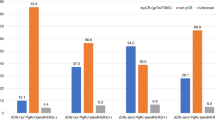Abstract
Background
The Japanese Breast Cancer Society Registry started in 1975; it was transferred to the registry platform of the National Clinical Database in 2012. We provide the annual data and an analysis of the Breast Cancer Registry for 2017.
Methods
Patients’ characteristics and pathological data of the 95,203 registered Japanese breast cancer patients from 1,427 institutes in 2017 were obtained. Trends in age at diagnosis and pathological stage were determined during the most recent 6 years (2012–2017).
Results
The mean onset age was 60.2 years with bimodal peaks at 45–49 years and 65–69 years. A short-term trend of the most recent 6 years of data caused the second, older peak. At diagnosis, 32.4% of breast cancer patients were premenopausal. The distribution of stages revealed that the proportion of early stage breast cancer (stage 0–I) increased up to 60%. At the initial diagnosis, 2.2% of patients presented with metastatic disease. Sentinel node biopsy without axillary node dissection was performed without neoadjuvant chemotherapy (NAC) in 68.8%, and with NAC in 31.1%, of patients. For patients without NAC, lymph node metastasis was less than 3% if the tumor size was less than 1 cm. The proportion of node-negativity decreased to 79.5% when tumor size was 2.1–5 cm.
Conclusions
This analysis of the registry provides new information for effective treatment in clinical practice, cancer prevention, and the conduct of clinical trials. Further development of the registry and progress in collecting prognostic data will greatly enhance its scientific value.



Similar content being viewed by others
References
Kubo M, Kumamaru H, Isozumi U, et al. Annual report of the Japanese Breast Cancer Society registry for 2016. Breast Cancer. 2020. https://doi.org/10.1007/s12282-020-01081-4,2019.
Sobin LH, Gospodarowicz MK, Wittekind C. TNM classification of malignant tumours. 7th ed. New York: Wiley; 2010. p. 131–141.
The Japanese Breast Cancer Society. General rules for clinical and pathological recording of breast cancer. 17th ed. Tokyo: Kanehara Shuppan; 2012.
Lakhani SR, Ellis IO, Schnitt SJ, Tan PH, van de Vijver MJ. WHO classification of tumours of the breast. 4th ed. Lyon: IARC Press; 2012.
Cancer Registry and Statistics. Cancer Information Service, National Cancer Center, Japan (Ministry of Health, Labour and Welfare, National Cancer Registry) 2020. https://ganjoho.jp/reg_stat/statistics/dl/index.html. Accessed 06 Jul 2020.
Goldhirsch A, Wood WC, Coates AS, et al. Strategies for subtypes—dealing with the diversity of breast cancer: highlights of the St Gallen International Expert Consensus on the Primary Therapy of Early Breast Cancer 2011. Ann Oncol. 2011;22(8):1736–47.
Acknowledgements
The authors thank all the affiliated institutes participating in the Breast Cancer Registry of the JBCS for their efforts to register the patients’ data.
Funding
This work was funded by the Registration Committee of the Japanese Breast Cancer Society.
Author information
Authors and Affiliations
Contributions
Study concept and design: NH and HJ. Assembly of data: HK and UI. Manuscript writing: NH. Critical revision of the manuscript for important intellectual content: The Registration Committee of the JBCS (HM, KT, MY, EO, MN, SA, YK, TK, KA, NN, MM, KI, MK, YY, SI, and HJ). Final approval of manuscript: SI and HJ.
Corresponding author
Ethics declarations
Conflict of interest
NH, MK, MM, YK, NN, and YY have received honorariums as a speaker or consultant/advisory role. NN and YY have received grants from Chugai Pharmaceutical Co. MM, YK. YY has received honorariums as a speaker or consultant/advisory role. YY have received grants from Eli Lilly. MM, YK, NN, and YY have received honorariums as a speaker or consultant/advisory role. YY have received grants from Eisai. NH, MM, YK, NN, and YY have received honorariums as a speaker or consultant/advisory role from AstraZeneca. NH, MM, YK, NN, YY, and HK have received honorariums as a speaker or consultant/advisory role. YY have received grants from Pfizer Japan Inc. MM, YK, and YY have received honorariums as a speaker or consultant/advisory role. YY have received grants from Taiho Pharma. MM, YK, and YY have received honorariums as a speaker or consultant/advisory role. YY has received grants from Daiichi-Sankyo. NH, YK, NN, and YY have received honorariums as a speaker or consultant/advisory role. YY have received grants from Novartis Pharma. NH, YK, and YY have received honorariums as a speaker or consultant/advisory role. YY has received grants, and MM has received non-financial support from Kyowa Hakko Kirin. YY has received grants and honorariums as a speaker or consultant/advisory role from Takeda. YY has received grants and honorariums as a speaker or consultant/advisory role from Sysmex. YY has received honorariums as a speaker or consultant/advisory role from GE Health Care Japan. NN has received grants from Nippon Mediphysics, Daiichi-Sankyo, BMS, and MSD. YY has received grants and honorariums as a speaker or consultant/advisory role from Nihon Kayaku. HK has received honorariums as a speaker or consultant/advisory role from Mitsubishi Tanabe Pharma. NH has received honorariums as a speaker or consultant/advisory role from Genomic Health Inc., Devicor Japan, and Allergan Japan. HK, HM, and UI report affiliation with the Department of Healthcare Quality Assessment at the University of Tokyo. The department is a social collaboration department supported by the National Clinical Database, Johnson & Johnson K.K., and the Nipro Corporation. YY and HJ are board members of the Japanese Breast Cancer Society. All of these declarations are outside the submitted work. The other authors declare that they have no conflict of interest.
Ethical approval
This article does not contain any studies with animals performed by any of the authors. All procedures performed in studies involving human participants were in accordance with the ethical standards of the institutional and/or national research committee and with the 1964 Helsinki declaration and its later amendments or comparable ethical standards.
Additional information
Publisher's Note
Springer Nature remains neutral with regard to jurisdictional claims in published maps and institutional affiliations.
About this article
Cite this article
Hayashi, N., Kumamaru, H., Isozumi, U. et al. Annual report of the Japanese Breast Cancer Registry for 2017. Breast Cancer 27, 803–809 (2020). https://doi.org/10.1007/s12282-020-01139-3
Received:
Accepted:
Published:
Issue Date:
DOI: https://doi.org/10.1007/s12282-020-01139-3




